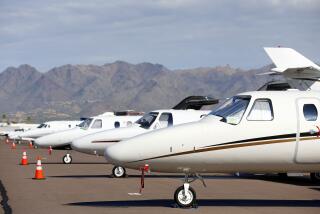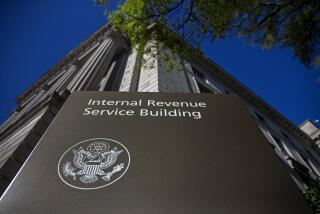‘Frequent Flier’ Awards Pose Taxing Problem
- Share via
Q: Last month there were news reports about the Internal Revenue Service going after some employees in Florida for their personal use of “frequent flier” mileage awards accumulated as a result of business travel. I am contemplating using my frequent flier miles later this year for a honeymoon trip to Europe. Some of the miles are the result of business travel that my employer paid for; some were accumulated from my own personal travel. Do I have to report this trip to the IRS? --A.R.
A: What answer do you want? The official, stick-by-the-books IRS position is that mileage awards accumulated as the result of travel paid by your employer are an employee benefit that must be included in a worker’s gross taxable income. The IRS’ unofficial, not-for-attribution position is that this is a sensitive, complicated area of the tax law that is not currently being enforced with all the muscle the IRS could bring to the matter if it so chose.
According to Randy Peterson, publisher of Inside Flyer magazine and an authority on frequent flier awards programs, 30 million Americans are enrolled in frequent flier programs. About 5 million travel award certificates are claimed each year. Peterson estimates that more than 90% of the mileage accumulated in these programs is the result of business-related travel paid by employers.
However, the big unknown in the frequent flier award business is the value of the travel award to the frequent flier program member. Most tickets awarded by frequent flier programs carry the notation that the ticket has no cash value. And just how would you value it? If you use the average price of the miles accumulated for the ticket, would you value them as of the dates they were accrued in your account or the date of your award travel? If you decide to value the certificate as if you had purchased it for that trip, which price would you use? Some advance booking price or a Saturday-night-layover price or some other discount? Even the IRS quietly admits that it’s all too complicated to unravel, given the existence of more pressing tax issues.
For the most part, businesses do not require their employees to give back the mileage awards they get on business travel. Peterson says the prevailing sentiment among businesses is that these awards are “intangible perks” that employees who spend a lot of time on the road are entitled to keep in exchange for the inconvenience that heavy travel schedules impose on their personal lives. In most cases, employers allow their workers to maintain as many frequent flier accounts as they wish and to mix their business travel awards with their personal travel mileage.
(Government employees, however, aren’t so lucky. According to the IRS, the federal government requires its employees to maintain a separate accounting of their personal and business travel awards--if not separate accounts--and to use any awards stemming from their government-paid travel for business trips.
(“Why should the taxpayers pay for a government employee’s vacation to Europe?” asks an IRS attorney. It remains unclear, however, how strictly this policy is enforced.)
Given the IRS’ position on travel awards, what happened in Florida to arouse the agency? According to Peterson, the IRS clamped down on employees who were selling their mileage back to their employer for cash, which they then failed to report as income on their tax forms. Remember, the airlines and the IRS have already been after mileage award brokers who buy and sell travel certificates. The latest IRS action can be viewed as an extension of the earlier crackdown on brokers, not a new offensive against using unreported award certificates for travel.
By the way, you may be wondering why mileage awards to airline customers are considered taxable while the free travel that airlines give their employees and their families is not. The reason for the apparent discrepancy is the difference between an employee and a customer. Employers are entitled to give their workers reasonable fringe benefits along with their normal wages. Airline employees get free travel; department store employees get merchandise discounts. Some newspapers, but not all, give their workers a free subscription.
Avoiding Pension Rollover Tax Bite
Q: I am in my late 30s, and the company for which I have been working for the last 15 years has recently reorganized. The result was the dissolution of my pension plan, where I had about $50,000 in benefits. I could either get the money in a lump-sum distribution or the company would purchase an annuity for me. I chose the former. Was that correct? Is it true that the government automatically withholds 20%, even though I plan to put the money into an individual retirement account?-- R.J.S.
A: Your decision gives you the most control possible over your money. It is entirely possible that your IRA investment decisions will produce better results than the annuity your company would have purchased. The reverse is also possible as well.
The federal government will levy a 20% withholding tax on your pension distribution only if you take possession of the money at any time before putting it into an IRA. If the $50,000 is rolled over directly to a qualified individual retirement account from your employer, no tax is applied.
The key issue here is whether the taxpayer ever takes possession of the money. Direct transfers between trustees of the pension money is the only way to avoid the tax.
These rules, which took effect Jan. 1, do not apply to IRA transfers or other IRA transactions. The rules apply only to distributions from employer-sponsored pension plans that are eligible for rollover into tax-deferred IRAs.
More to Read
Sign up for The Wild
We’ll help you find the best places to hike, bike and run, as well as the perfect silent spots for meditation and yoga.
You may occasionally receive promotional content from the Los Angeles Times.






